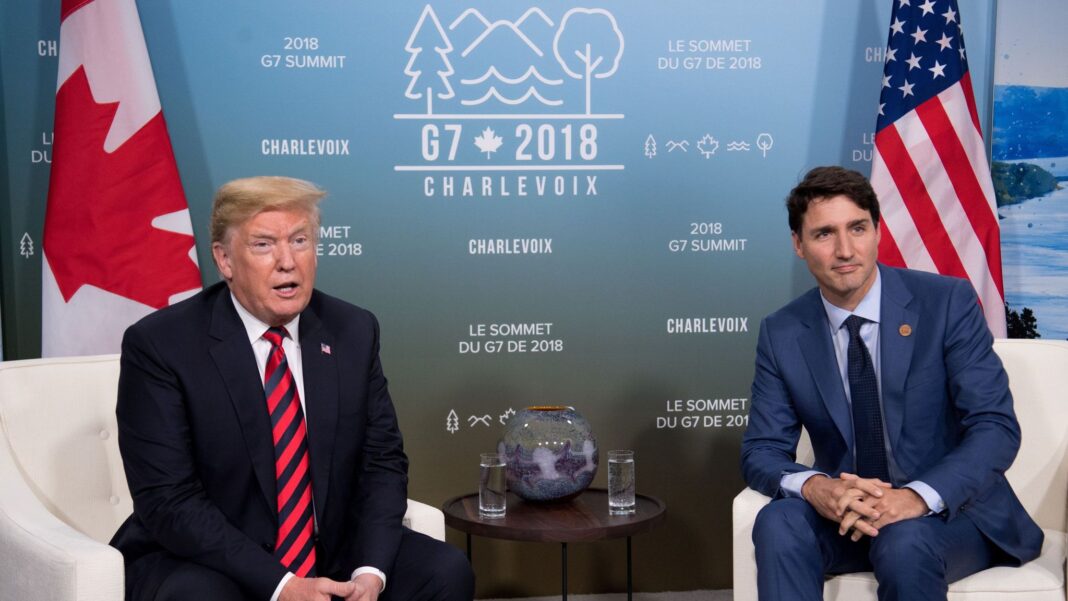A Glimpse into the Future of U.S.-Canada Relations As Donald Trump clinches victory in the U.S. presidential race for a second term, Canadian political leaders are bracing for what lies ahead in the next four years of Canada-U.S. relations.
The 45th president’s first term was marked by numerous confrontations over trade, immigration, and diplomatic relations, and his second term promises to be no different, with looming challenges for Canada.
A Look Back at Tough Moments
NAFTA Renegotiations:
Shortly after Trump took office in 2017, he pushed hard to renegotiate the North American Free Trade Agreement (NAFTA) with Canada and Mexico. Tensions rose as Trump threatened to pull out of the agreement entirely unless changes were made.
After months of often bitter negotiations, the new trade agreement—the United States-Mexico-Canada Agreement (USMCA)—was signed in 2018 and took effect in 2020. The deal altered key trade aspects, including giving the U.S. greater access to Canada’s dairy market in exchange for keeping a dispute resolution process intact.
Carleton University’s Aaron Ettinger, an expert in U.S. foreign policy, said the process was “grueling and arduous,” with the entire economic stability of Canada at stake.
The USMCA is set for review in 2026, and Trump has vowed to reopen the agreement, echoing campaign promises to introduce new tariffs on imports.
Trump’s Immigration Policies:
Trump’s executive order in 2017, banning citizens from several Muslim-majority countries, sparked outrage worldwide, including in Canada. Canadian officials scrambled to understand the impacts on immigration and refugee policies, while Trudeau quickly voiced Canada’s welcoming stance: “Canadians will welcome you, regardless of your faith.”
Under Trump’s first term, Canada saw a spike in asylum seekers, many of whom crossed the border from the U.S. amid fears of deportation.
With Trump promising mass deportations during his second term, experts warn Canada must prepare for a potential wave of migrants seeking refuge.
Former immigration minister Jason Kenney cautioned that Canada “does not have the ability to police” a sudden surge of asylum seekers.
Diplomatic Tensions at the G7 Summit:
In 2018, tensions between Trump and Trudeau reached a boiling point following the G7 summit in Charlevoix, Quebec. After Trudeau rejected Trump’s proposals on trade and tariffs, Trump lashed out on Twitter, calling the Canadian prime minister “very dishonest” and “weak.”
The fallout from this confrontation strained diplomatic relations and set the tone for a tumultuous period of bilateral interactions.
Trade Tariffs:
In 2020, Trump imposed tariffs on Canadian aluminum products, reviving trade tensions that had seemed to ease. In retaliation, Canada imposed dollar-for-dollar tariffs on U.S. goods. At the time, Deputy Prime Minister Chrystia Freeland called the Trump administration “the most protectionist in U.S. history,” and many Canadian provincial leaders, including Premier François Legault, expressed their disapproval.
With Trump vowing to enforce a global minimum tariff of 10% on imports during his second term, Canadian officials are already working behind the scenes to avoid further tariffs. However, experts believe Trump is unlikely to back down, with Gerald Butts, Trudeau’s former principal secretary, suggesting that Trump is “not afraid to wield access to the U.S. market to get what he wants.”
Looking Ahead:
Will Relations Improve?
As Trump returns to the White House, Canada must navigate a complicated relationship that balances trade, immigration, and diplomatic issues. The groundwork for addressing these tensions is already being laid, with ongoing talks about avoiding new trade tariffs and ensuring that Canada’s immigration policies remain a point of pride. However, the future remains uncertain, with experts like Ettinger predicting that Trump’s second term will bring more challenges for Canada, especially in terms of trade policy and immigration.






